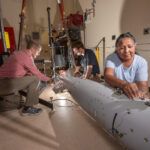70 years of speaking knowledge to power
By Lawrence M. Krauss | November 24, 2015

As chair of the Board of Sponsors—a group initiated soon after Robert Oppenheimer and Albert Einstein helped form the Bulletin of the Atomic Scientists in 1945—I was humbled to speak at the publication's 70th anniversary dinner, where supporters once again convened, following a symposium, to explore the greatest existential challenges facing the world today.
I was tempted to begin my talk by saying happy birthday, but of course the birth of the Bulletin was not a joyous moment; rather, it was a somber one. Founded as it was by Manhattan Project scientists who “could not remain aloof to the consequences of their work,” the Bulletin had an immediate, urgent purpose, but it would be preferable to live in a world in which the Bulletin was not necessary. As pressing as the need seemed in 1945 to alert the public to the dangers of nuclear war and to stem the growth of nuclear arsenals, however, the Bulletin is more necessary today than perhaps at any other time in its 70 year history.
With the development of nuclear weapons, humanity crossed a threshold: For the first time, the human race had the power to almost instantaneously and globally change the conditions for all life on our planet, and alter the environment in ways that could lead, if not to the extinction of our species, to the end of civilization as we know it.
Seventy years after the Nuclear Age began, the 21st century has brought a host of new global challenges for humanity to face. Even if it avoids the catastrophic impact of a nuclear conflict, with its 7.3 billion members (and counting) humanity has a gluttonous need for fossil fuel, and that need is changing the climate. With a build-up of atmospheric greenhouse gases that will last for 1,000 years, we are likely to have to live in an Earth 2.0, with potentially catastrophic climatic impacts on billions of the poorest people on the planet, with equally dangerous potential impact on geopolitical stability around the globe.
Developments in biology have the potential to change not only what we mean by life itself—as I expect will happen in this century—but also are increasing the potential for biotechnology to become a useful tool for terrorism.
The increasing dependence on the Internet and the tools of artificial intelligence has created new vulnerabilities not only in regard to cyber-terrorism that could undermine economic stability, but also in the realm of potentially dangerous issues of command and control in military applications. Of particular worry is the possibility that the military will assume applications, software, and hardware have more intelligence than really exists, with potentially disastrous consequences.
At the same time, we live in a world where there are few filters to separate scientific sense from nonsense. While the Internet has opened up information, it has also made it easier to promulgate lies. Media campaigns in this digital landscape are effective at changing hearts and minds, and climate change deniers spend more on advertising than the Intergovernmental Panel on Climate Change spends on research. Politicians can distort with impunity. At the time of this writing, the leading candidate for the Republican Party presidential nomination was openly stating his belief that Earth is 6,000 years old, the Grand Canyon is a result of Noah’s flood, the pyramids were created by Joseph to store grain, and evolution is the work of the devil. Yet these dissimulations seem to matter less to the public than the question of whether that candidate lied when he claimed to have applied to West Point.
Unfortunately, the public is, in general, ill equipped to filter out scientific nonsense. Depending upon the poll, a majority or a significant minority of Americans don’t accept the reality of human-induced climate change, or of evolution, for that matter. When it comes to ballistic missile defense systems, which even now have never been tested against realistic threats, most of the public thinks we already had a working system, even before the first interceptors were commissioned. (In this regard I have always felt that simply claiming to have a fictitious working system was at least as useful, and much cheaper, than committing billions of dollars to an unworkable missile defense program.)
When I think about public policy and existential dangers, two relevant quotes come to mind. The first is from one of my favorite science fiction writers, Philip K. Dick, which I think is relevant: “Reality is that which, when you stop believing in it, doesn’t go away.” Sound empirical data are essential to sound public policy. And the scientific community can greatly increase the probability that sound policies are pursued—especially on issues that affect humanity on a global basis—by actively disseminating information and openly questioning policymakers when they make unsubstantiated claims. It was in this spirit that the first co-chair of the Board of Sponsors of the Bulletin of the Atomic Scientists, Robert Oppenheimer, wrote in the Bulletin in 1951:
We do not believe any group of men adequate enough or wise enough to operate without scrutiny or without criticism. We know that the only way to avoid error is to detect it, that the only way to detect it is to be free to enquire. We know that the wages of secrecy are corruption. We know that in secrecy error, undetected, will flourish and subvert.
This is the heart of what the Bulletin of the Atomic Scientists is all about. It is a trusted place where scientists can connect to the public and help guide policymakers, in an open and nonpartisan way, to counter misconceptions and bridge the gulf between propaganda and reality.
There is no shortage of illusions about the important issues the Bulletin addresses. Sample misconceptions include:
- Limited nuclear war, without global environment and geopolitical effects, is possible.
- Nuclear weapons have a strategic purpose.
- Nuclear weapons treaties aren’t verifiable, so military strategies to limit proliferation are preferred.
- Updating our nuclear arsenal at a cost of $1 trillion would increase our security more than getting rid of the arsenal.
- Climate change is an issue for the future; it is based on theoretical models rather than empirical facts about the present.
At present, the Bulletin is the only place where the existential threats facing humanity are rationally described, with detailed technical and scientific backup, without regard to politics or ideology, and in a way that is comprehensible to both the general public and policy makers. There is no other organization at present with a longstanding tradition of such goals that aims not to lobby, but to inform.
Our newest Board of Sponsors member, Gareth Evans, once said that observing the world is not the same as changing it. The Bulletin aims to do both. The Doomsday Clock is one proven tool that provides a jolt of emotion and briefly wakes the world once every year. But the rest of the year, the Bulletin provides the substance that can help direct policy makers to address real threats. While the Doomsday Clock is a brand with impact throughout the world, the day-to-day role of the Bulletin is probably more important, providing trustworthy information on existential threats, in a form accessible to all.
Finally, the efforts associated with the Bulletin do not merely increase our security; they enhance our humanity. Let me quote Robert Oppenheimer once again, this time from 1953:
The open society, the unrestricted access to knowledge, the unplanned and uninhibited association of men for its furtherance — these are what may make a vast, complex, ever growing, ever changing, ever more specialized and expert technological world, nevertheless a world of human community.
Honest communication helps create and preserve the human community.
On a personal note I cannot help but remember on this 70th anniversary my own first exposure to the Bulletin. As a PhD student at MIT, I watched mentors I admired, from Bernie Feld to Philip Morrison, take time out from their work as scientists to reach out as responsible citizens. These individuals were interested not only in generating knowledge but in disseminating it. I vowed then that one day, if I had a chance, I would do the same. Speaking on behalf of the Bulletin on its 70th anniversary, as chair of a group initiated by Albert Einstein and Robert Oppenheimer and most recently co-chaired by my friend Leon Lederman, is incredibly humbling for me. It is both a tremendous responsibility and a tremendous privilege to help lead the work of the Bulletin at this time.
Ultimately, it is worth celebrating 70 years of the Bulletin not because we have existed as an organization for this long, but because of the integrity, dedication, and impact that have been associated with it over these years. Society will always face global challenges. We will always need an organization dedicated to revealing truth about the world, inconvenient or not, politically correct or not. A civilization governed and driven by ideology and myth demeans the experience of being human, holds back children and adults alike from developing their full potential. Thus, what I celebrate most on this anniversary is not only its cause—human safety—but as Oppenheimer stressed, the contribution of the Bulletin to the human community. We owe it to our common humanity to both celebrate the knowledge we have gained, and also to openly discuss it in the public arena, as a basis for governing our actions. The Bulletin represents the best about what it means to be human. It must continue to remind people how to separate reality from wishful thinking, so that the human community will both be preserved, and continue to be worth preserving.
Editor's note: This article is adapted from an address delivered on Nov. 16, 2015, during the Bulletin's 70th anniversary dinner in Chicago.
Together, we make the world safer.
The Bulletin elevates expert voices above the noise. But as an independent nonprofit organization, our operations depend on the support of readers like you. Help us continue to deliver quality journalism that holds leaders accountable. Your support of our work at any level is important. In return, we promise our coverage will be understandable, influential, vigilant, solution-oriented, and fair-minded. Together we can make a difference.















